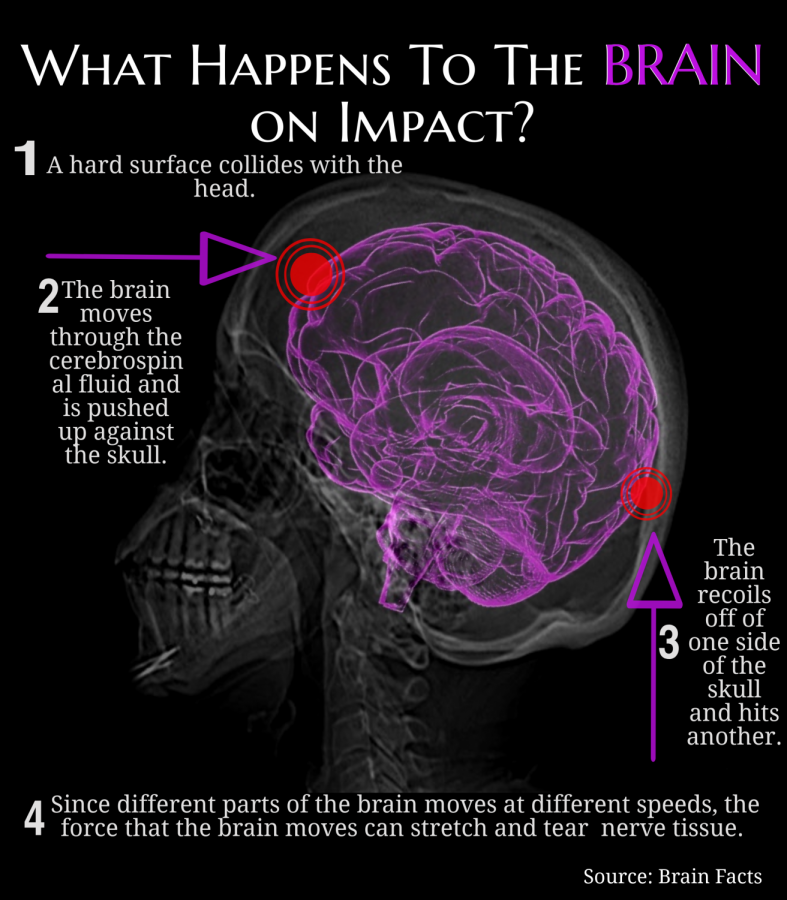Saxton faces a silent battle
February 6, 2019
The moment her head hit the ground, the world around her began to fade away. She turned over and the world came back. Little did she know that it would never be the same.
Elyse Saxton doesn’t remember ever hitting the ground after tripping on the soccer field. She remembers turning over, winded and getting up off the ground but never remembers hitting her head. Her teammates told her afterward that she fell into the field, chest first, her head ricocheting off the ground.
When Saxton got home from the soccer game, she lacked focus and had pain throughout her neck due to the fall but she “didn’t think anything was wrong,” and thought she “would be fine.”
She didn’t realize that she hit her head until it was too late. She continued to play in that game as well as the following soccer game. Her head started to hurt, and her depth perception was off, causing her to get hit in the head with the soccer ball twice more in the same game.
It wasn’t until the soccer game two or three days after her fall, when she clutched her head in pain and a fellow teammate noticed and encouraged her to get checked out, that Saxton agreed. A doctor confirmed her suspicions of having a concussion.
“A concussion is a form of traumatic brain injury after experiencing a bump, blow, or jolt to the head,” according to the Centers for Disease Control and Prevention.
It was headaches on and off for four months after receiving her concussion. With Saxton’s concussion, her eyes were not able to follow a straight line, meaning she had difficulties reading as well as seeing things on the board in her classes.
To treat her concussion, Saxton worked with various health professionals such as a sports physician who focused in concussions as well as a counselor. She also received a low-dose of antidepressants used to treat her headaches.
Even with the medication, the pain from her concussion was overwhelming, but Saxton didn’t want to constantly be taking pain medication.
“It was hard for me too because I didn’t want to be taking all of the pain medication because it can do bad things for your body. [If I did end up taking it,] it would have been every day,” Saxton said.
Even now, Saxton feels the largest repercussion is the anxiety caused by the stress that once motivated her. She still deals with this anxiety brought on by stress.
“I would be afraid to go to sleep. I would be afraid that if I went to sleep, I would wake up and wouldn’t be able to start [my mind],” Saxton said.
There was even anxiety when it came to sleeping, which is an important component to the healing process.
“I would be afraid to go to sleep. I would be afraid that if I went to sleep, I would wake up and wouldn’t be able to start [my mind] again,” Saxton said.
After working it out with a counselor, things eventually got better.
Looking back on that time frame, Saxton recognized that she did not have a healthy mindset. Saxton felt like she was a “burden” to her friends and family because she was causing her loved ones to stress about her health.
“‘I am this way because I did it. [This concussion] is my fault and there’s nothing I can really do’ was a mindset I had throughout the concussion,” Saxton said.
Saxton played two games after the concussion, experiencing several blows to head following her first fall, causing the severity of it to increase. She also took ibuprofen afterward, which is a blood thinner and only caused more problems, not realizing that it was a bad thing to take. She only missed about half a day of school, not allowing her brain to heal.
“It’s kind of scary” that many of the problems very well could have been prevented if the proper steps were taken or if she would have known about concussions before.

The one good thing that came out of her concussion is the empathy that came from it. Concussions are a “silent disease,” so Saxton is more empathetic towards the problems that people can’t see.
“When someone has a broken arm or is in a wheelchair you realize they have this disability, but with people with concussions, you don’t always see it,” Saxton said.



